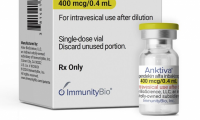-
Drug Licensed from Sanofi Becomes First FDA-Approved Therapy for Ultra-Rare Primary Immunodeficiency
- Source: https://medcitynews.com/author/fvinluan/
- 87
- May 4, 2024
-
AstraZeneca’s Lynparza to dominate PARP inhibitors market with $4 bn in sales by 2027
- Source: https://www.expresspharma.in/astrazenecas-lynparza-to-dominate-parp-inhibitors-market-with-4-bn-in-sales-by-2027-globaldata/
- 162
- May 4, 2024
-
FDA approves X4 Pharmaceuticals’ WHIM syndrome drug
- Source: https://www.pharmaceutical-technology.com/news/fda-x4-syndrome-drug/?cf-view
- 102
- May 3, 2024
-
Medtronic wins FDA approval for Inceptiv closed-loop spinal cord stimulator
- Source: drugdu
- 73
- May 2, 2024
-
Pfizer’s First Gene Therapy Approval Sets Up a Showdown With CSL in Hemophilia B
- Source: drugdu
- 70
- May 2, 2024
-
FDA Approves Immunotherapy That Can Spare Bladder Cancer Patients From Radical Surgery
- Source: https://medcitynews.com/author/fvinluan/
- 106
- May 2, 2024
-
FDA Approves Pfizer’s Beqvez for the Treatment of Adults with Moderate to Severe Hemophilia B
- Source: drugdu
- 80
- May 1, 2024
-
Fosun Pharma’s Self-developed Artemisinin Medicines Inject New Impetus to Malaria Prevention and Treatment in Africa
- Source: drugdu
- 70
- April 30, 2024
-
【EXPERT Q&A】What is the relationship between FDA registration and 510K registration for medical devices and what is the difference?
- Source: drugdu
- 164
- April 30, 2024
-
AI-Powered Digital Imaging System to Revolutionize Cancer Diagnosis
- Source: drugdu
- 108
- April 29, 2024
your submission has already been received.
OK
Subscribe
Please enter a valid Email address!
Submit
The most relevant industry news & insight will be sent to you every two weeks.













